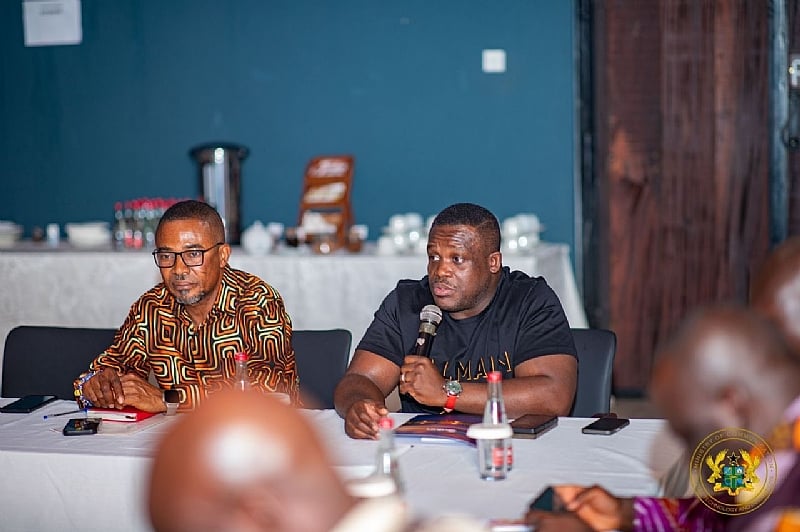The Ministry of Communication, Digital Technology and Innovations (MoCDTI) convened a two-day workshop with the Parliamentary Select Committee on Information and Communications to delve into the Ministry’s ambitious 2025 programme of activities and the strategic blueprints of its subordinate agencies. This collaborative endeavor underscored the Ministry’s commitment to transparency and parliamentary engagement in shaping the future of Ghana’s digital landscape. The workshop provided a platform for robust discussions on critical policy initiatives, legislative proposals, and agency-specific plans, fostering a shared understanding of the challenges and opportunities within the ICT sector.
Central to the workshop’s agenda was the Ministry’s commitment to strengthening Ghana’s legislative framework governing the digital sphere. Hon. Samuel Nartey George, Minister for Communication, Digital Technology and Innovations, announced the development of fifteen legislative proposals encompassing crucial areas like the digital economy, cybersecurity, and data protection. These bills, to be presented to Parliament in stages, aim to create a robust legal foundation for the burgeoning digital ecosystem, ensuring adequate safeguards and promoting responsible innovation. The proposed legislation highlights the Ministry’s proactive approach to addressing emerging challenges and regulating the rapidly evolving technological landscape, ultimately striving to protect citizens’ rights and promote sustainable growth in the digital economy.
A key reform discussed during the workshop was the restructuring of the National Information Technology Agency (NITA). The Minister revealed NITA’s planned transformation into a purely regulatory entity, streamlining its focus on oversight and policy implementation. NITA’s current service delivery functions, including the management of government IT assets, will be transferred to a newly established organization, the details of which are yet to be finalized. This strategic restructuring aims to enhance efficiency and specialization within the government’s IT operations, allowing NITA to concentrate on establishing and enforcing industry standards, promoting interoperability, and ensuring the security and integrity of government information systems. By separating service delivery from regulatory functions, the government aims to create a more agile and responsive IT landscape, facilitating innovation and effective management of digital resources.
The workshop also provided an update on the One Million Coders Initiative, a flagship program designed to equip Ghanaian youth with essential digital skills and create employment opportunities. The Minister emphasized the acceleration of the initiative through Public-Private Partnerships (PPPs), leveraging the expertise and resources of industry giants such as Huawei, MTN, Amazon Web Services (AWS), and Oracle. These collaborations will enrich training modules and align them with industry best practices, ensuring that participants acquire relevant and marketable skills. By empowering young people with coding proficiency, the initiative aims to bridge the digital skills gap, foster innovation, and contribute to the growth of the digital economy.
Recognizing the critical importance of equitable access to digital resources, Hon. George appealed to Members of Parliament to support the revitalization of Community Information Centres (CICs) and local ICT training facilities. These centers serve as crucial hubs for digital literacy and skill development within communities, providing access to computers, internet connectivity, and training programs. By upgrading these facilities, the Ministry aims to bridge the digital divide and ensure that all citizens, regardless of location, have the opportunity to participate in the digital revolution. This emphasis on community-level access underscores the Ministry’s commitment to inclusive digital development, recognizing that digital literacy is essential for economic empowerment and social inclusion.
The two-day workshop fostered a collaborative environment, bringing together key stakeholders from the government and parliament to discuss the future of Ghana’s digital ecosystem. The presence of Mr. Alexander Yaw Arphul, Chief Director of the Ministry; members of the Parliamentary Select Committee on Information and Communication; and directors and staff from the Ministry and its agencies facilitated a multi-faceted dialogue. This collaborative approach underscores the Ministry’s commitment to transparent governance, stakeholder engagement, and a shared vision for a digitally empowered Ghana. The workshop serves as a testament to the ongoing efforts to strengthen the legislative framework, enhance institutional capacity, and promote inclusive digital development across the nation. By working closely with parliament and its agencies, the Ministry aims to create a vibrant and sustainable digital economy that benefits all Ghanaians.














